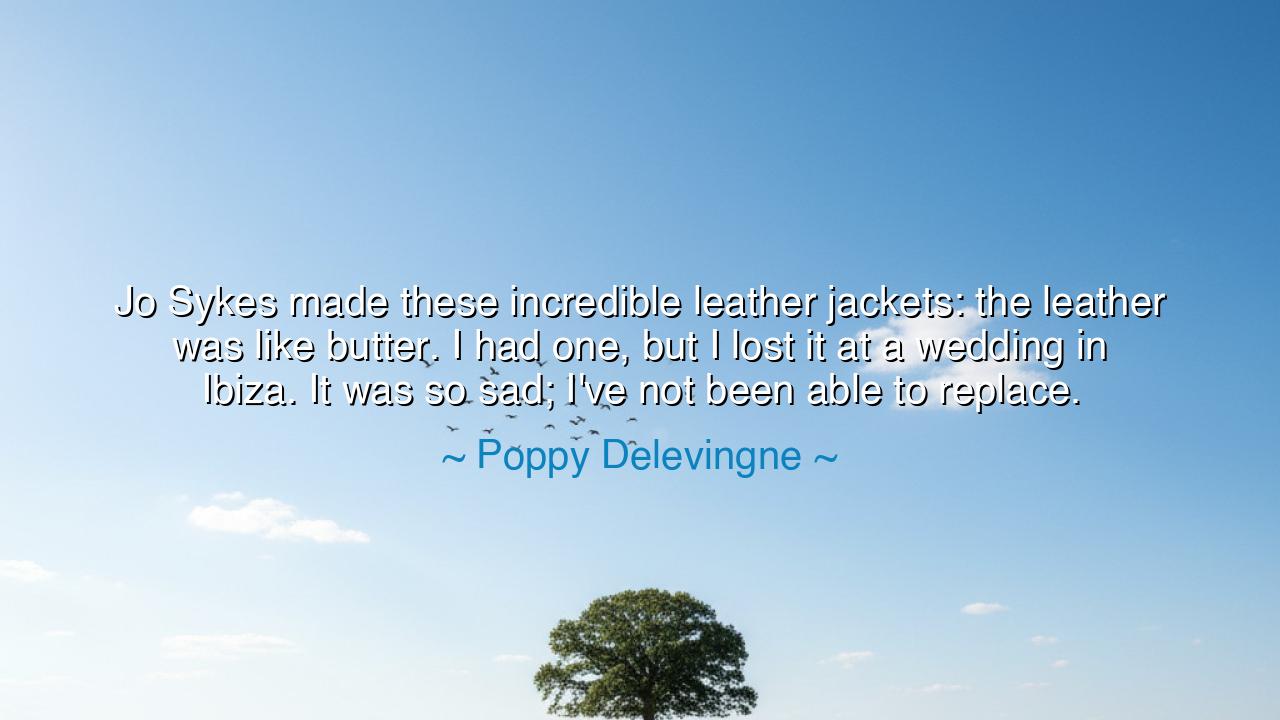
Jo Sykes made these incredible leather jackets: the leather was
Jo Sykes made these incredible leather jackets: the leather was like butter. I had one, but I lost it at a wedding in Ibiza. It was so sad; I've not been able to replace.






Hear now, O lovers of memory and beauty, the tender words of Poppy Delevingne, the model and muse whose life has been adorned with both fashion and feeling: “Jo Sykes made these incredible leather jackets: the leather was like butter. I had one, but I lost it at a wedding in Ibiza. It was so sad; I’ve not been able to replace.” Though the words seem simple—of garments and loss—they carry a deeper chord, one that speaks of attachment, impermanence, and the quiet sorrow of irreplaceable things. For the ancients, too, understood that even the smallest loss can awaken the vast ache of impermanence within the human heart.
The origin of this quote lies in Delevingne’s world of artistry and fashion, where objects are not mere possessions but symbols of memory. The jacket she speaks of—crafted by designer Jo Sykes—was more than clothing; it was a vessel of self-expression, a piece of identity woven in texture and time. When she lost it at a wedding in Ibiza, an island known for joy and freedom, the sorrow that followed revealed a paradox: even amid celebration, life reminds us that beauty is fleeting. To lose something beloved in a moment of revelry is to feel the balance of existence—joy and grief intertwined.
Yet, beyond the jacket itself, her lament touches on the human condition of longing. How many of us have lost something—a keepsake, a photograph, a melody—that seemed trivial to others but essential to us? It is not the object alone that we mourn, but the part of ourselves bound within it. Delevingne’s sadness echoes the ancient truth that possessions, when loved deeply, become extensions of our spirit. The philosophers of old would say: “The soul grieves not for leather or gold, but for the fragment of memory they once held.”
Consider, too, the story of Emperor Hadrian, who built temples and monuments across the Roman world, yet wrote his most intimate verses for his lost companion, Antinous. All his power could not restore what was gone. The ache of loss, whether of a person or a thing, humbles the mighty and softens the proud. Likewise, Delevingne’s simple confession carries humility—it is the vulnerability of one who admits that some treasures cannot be replaced, for they live not in shops, but in moments now vanished.
Her words also remind us of the illusion of permanence that modern life teaches us to chase. We live believing we can replace anything—buy another, make another, find another—but the heart knows otherwise. Some things, once lost, remain unrepeatable. The butter-soft leather of that jacket became a metaphor for the tenderness of all things transient. Its absence whispers a lesson: value what you hold while it is within your hands, for time takes even the most beautiful quietly, without warning.
From this small story of loss arises a profound lesson of gratitude and mindfulness. Cherish what you have—not for its price or fame, but for the meaning it carries in your life. Whether it is a gift, a place, or a person, do not wait for absence to awaken appreciation. And if something dear slips away, as Delevingne’s jacket did, grieve not in despair but in reverence, knowing that the beauty of life lies in its impermanence.
Thus, let her words endure as a gentle teaching: to lose is to learn, to remember is to honor, and to live with gratitude is the highest art of all. For even the loss of a jacket may remind us that every beloved thing—be it fabric or friendship—is a fleeting miracle. And though we may never replace what is gone, we can still carry its essence in the quiet chambers of the heart, where memory keeps what time has taken.






AAdministratorAdministrator
Welcome, honored guests. Please leave a comment, we will respond soon